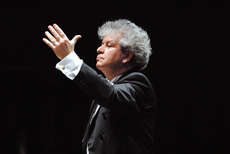
One of the more anticipated classical concerts this season will take place on Wednesday, March 21, when the Prague Philharmonia and its founder and honorary artistic director, Czech conductor Jiří Bĕlohlávek, bring an exceptionally interesting program to the Bohemian National Hall. They will be performing Mozart's Don Giovanni Overture, Janáček’s Suite for Strings, and Voříšek's Symphony in D. The Mozart is well known, of course, but the Janáček is a relatively early work of his and the Voříšek -- the main work on the program -- is a masterpiece heard far too rarely in concert halls, especially in the U.S.
It's worth remembering that most of what is now the Czech Republic, notably the regions Bohemia and Moravia, were for centuries part of the Habsburg Monarchy AKA the Austro-Hungarian Empire. Because of the region’s time behind the Iron Curtain, some Americans may mistakenly consider it a recently emerging culture and forget its long, much-honored involvement with the core of Western classical music. Mozart, after all, spent time in Prague, where he had a devoted fan base that continued to love his music after the fickle Viennese had moved on to newer kids in town. That is part of how he came to write his Symphony No. 38, which premiered in Prague and has been named as such ever since. (There’s an excellent 2003 CD on Supraphon of Bĕlohlávek leading the Prague Philharmonia in Mozart's "Prague" Symphony and Voříšek’s Symphony in D.) Don Giovanni was first staged not in Vienna, but in Prague (in 1787, the year after the symphony), so its Overture is an apt opener for this concert.
Moravian composer Leoš Janáček’s (1854-1928) six-movement Suite for Strings was one of his first instrumental pieces, receiving its first performance in 1877. Maestro Bĕlohlávek calls it "a work of his youth which bears clear signs of the style his beloved teacher Antonín Dvorák had taught him. We cannot find here the typical Janáček language from the late period of his life and work, but the piece has lovely qualities in its richness of the different moods and shows brilliantly Janáček's melodic gifts." The opportunity to hear it played by a top-notch orchestra is a rarity here.
Of the major work on the program, Bĕlohlávek says, "The Symphony in D major by Jan Václav Hugo Voříšek has an important significance among compositions written around the same time by Czech composers. Voříšek was an excellent pianist, admirer of Beethoven, and friend of Franz Schubert, both of whom he met in Vienna. The music of the Symphony, which he wrote in 1821, is a composition which uses principles of late Classicism but already brings some characteristic elements of the new Romantic style, and in this respect it is the first example in Bohemian tradition."
Born in Vamberk, Bohemia, Voříšek (1791-1825) was highly esteemed during his lifetime, and he didn’t achieve his fame in some rural backwater. Already having impressed observers early as a child prodigy, Voříšek moved to Vienna at age 22 and spent the next (and last) 12 years of his life there; he was appointed conductor of the famous Gesellschaft der Musikfreunde in 1818 and principal court organist in 1823 and held both posts until the premature end of his life due to tuberculosis. One inevitably wonders what further fine works might have resulted had this gifted pianist and composer lived longer.
Since its rediscovery in the middle of the 20th century,Voříšek's sole symphony has risen to rank as his most famous work. It is cited by Jan Smaczny as "the first major contribution to the genre by a Czech in the nineteenth century" ("The Czech Symphony" in A Guide to the Symphony, ed. Robert Layton, Oxford 1993). Its thematic persuasiveness and original touches makes it very appealing. Its majestic slow movement is particularly brilliant, and in their recording, Bĕlohlávek and the Prague Philharmonia made the most of it. "I love the piece," he enthuses, "and every occasion when I can perform it with the Prague Philharmonia is a great joy, as we have worked on the symphony for long time and we are still finding new exquisite details in the score." The opportunity to hear them play it in person should not be missed.
Bohemian National Hall is at 321 East 73rd Street in Manhattan. Tickets are $40 and may be purchased in advance at CzechCenter.com and (if still available) at the door the night of the concert. It's also worth noting that before and after the concert, audience members may avail themselves of Czech beer, Czech liquor and other spirits, and snacks in the convivial atmosphere of the Bohemian National Hall’s bar.
